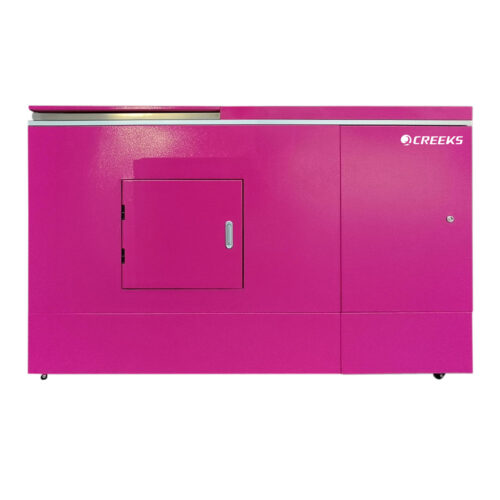Automatic Organic Waste Composting Machine – Reduce Waste Easily
Organic waste composting machines are innovative devices designed to accelerate the decomposition of food scraps, garden waste, and other biodegradable materials into nutrient-rich compost. Unlike traditional composting methods, which take weeks or months, these machines use advanced technology (such as shredding, heating, and aeration) to produce compost in as little as 24 hours.
Creeks’ organic waste composting machine reduces the environmental impact and the inefficiency of a centralized organic waste management. Small-scale composting cuts transport costs and waste taxes, giving back a fertile outcome that is highly rich in nutrients. This compost increases the soil fertility of agricultural fields, pots, and green areas.
Organic waste stops being polluting waste and is turned into a resource, a raw biomass able to fertilize soil and generate new products. Composting offers a viable alternative to poor centralized waste management, paving the way for the circular economy.
Our organic waste composting machine uses a natural aerobic process with no need for water. Power is only needed to run the machine, and solar panels can be attached to further improve the overall operating efficiency. No harmful greenhouse gases are produced only fresh, rich compost.
The organic waste composting machine accelerates the decomposition of organic waste, efficiently turning it into nutrient-rich compost. They create optimal conditions like temperature and aeration, allowing microorganisms to break down the waste quickly.
The Compost Technology
Microorganisms produce compost, a soil conditioner, by biologically degrading biodegradable waste such as vegetable/fruit scraps, food waste, garden waste, tea/coffee waste, etc. Microorganisms, mostly invisible to the naked eye, biochemically break down organic substances in waste with the help of atmospheric oxygen during composting.
Organic waste composting machines play a crucial role by automating organic waste decomposition and speeding up material breakdown. These machines ensure optimal conditions for microorganisms to thrive, delivering efficient and consistent compost production.
During composting, organic material decomposes rapidly at first, then slows down until it forms stable organic mass. After this stage, the slowly decomposing organic substances stabilize and mature.
Why Should We Use an Organic Waste Composting Machine?
Nature slowly transforms biodegradable waste. Organic waste composting machines used for the Zero Waste Project accelerate this process by creating conditions that activate microorganisms, producing compost within approximately 24 hours.
By using organic waste composting machines, you can achieve an efficient solid waste management system. Separating biodegradable waste with a high mass-volume ratio at its source results in cleaner remaining solid waste. This allows for easier compression and better waste management. Efficiently managing wet biodegradable waste will help produce high-quality compost and improve collection systems.
Benefits of Using Organic Waste Composting Machines
1. Environmental Benefit: With organic waste composting machines, you can cut transport costs and considerably reduce the amount of waste that ends up in landfills or burned. This way composting reduces GHGs and ground water pollution. It helps people who want to take part in a new cycle of social cooperation and co-responsibility.
2. Practical Benefit: Damp and smelly organic waste bags are replaced by efficient and odorless composters that can be controlled remotely. Small-scale composting optimizes processes and returns fertile and nutrient-rich soil, reusable in every garden, planter, or vase.
3. Economic Benefit: In the mechanism of circular economy, management costs are offset by the transformation of waste into a resource. Besides, European lawmakers are offering grants for the purchase of a composting machine.
Have a question? Ask Food Composters Manufacturer – Creeks your questions.






